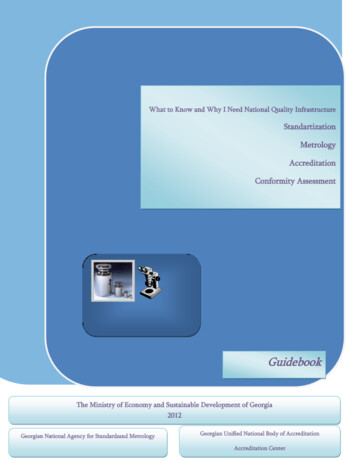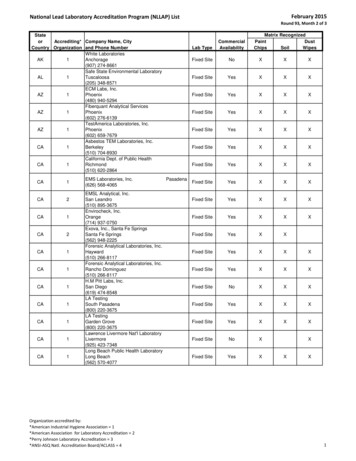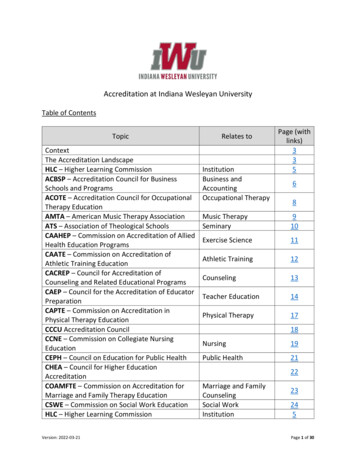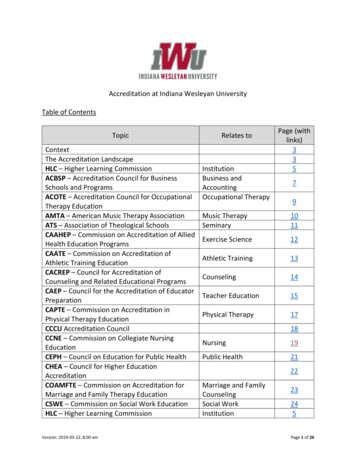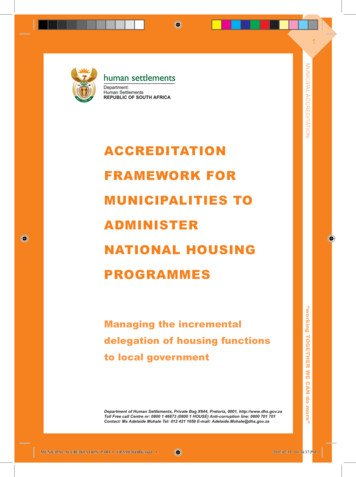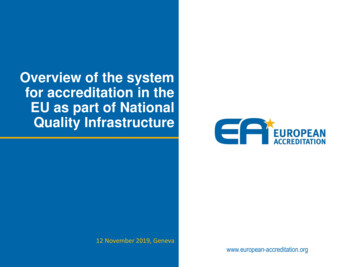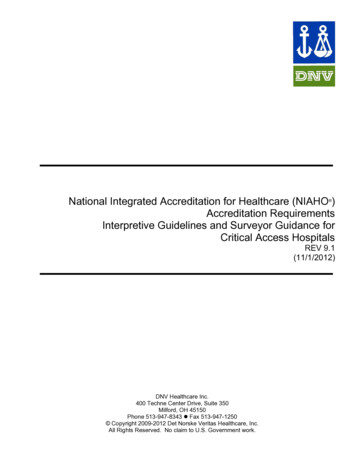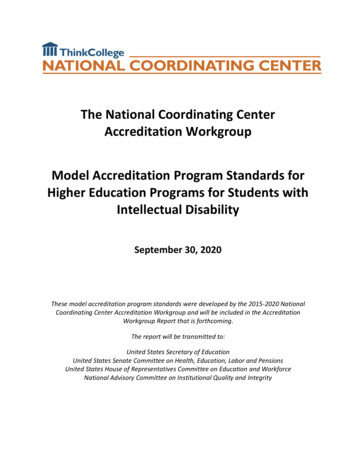
Transcription
The National Coordinating CenterAccreditation WorkgroupModel Accreditation Program Standards forHigher Education Programs for Students withIntellectual DisabilitySeptember 30, 2020These model accreditation program standards were developed by the 2015-2020 NationalCoordinating Center Accreditation Workgroup and will be included in the AccreditationWorkgroup Report that is forthcoming.The report will be transmitted to:United States Secretary of EducationUnited States Senate Committee on Health, Education, Labor and PensionsUnited States House of Representatives Committee on Education and WorkforceNational Advisory Committee on Institutional Quality and Integrity
The Think College National Coordinating Center is funded by the Office of PostsecondaryEducation, US Department of Education to provide knowledge development, technicalassistance, training and dissemination, and leadership and collaboration for Transition andPostsecondary Education Programs for Students with Intellectual Disabilities (TPSID) granteessupporting the growth and enhancement of postsecondary options for students withintellectual disabilities throughout the United States.Think College National Coordinating CenterInstitute for Community InclusionSchool for Global Inclusion and Social DevelopmentUniversity of Massachusetts Boston100 Morrissey Blvd.Boston, MA 02125DisclaimerThe Model Accreditation Standards developed by the National Coordinating CenterAccreditation Workgroup on Model Accreditation Standards for Higher Education Programs forStudents with Intellectual Disability reflects the views of the members of the Think CollegeAccreditation Workgroup and does not necessarily reflect the views of the Secretary ofEducation or the US Department of Education.Recommended Citation: National Coordinating Center Accreditation Workgroup (2020). Model AccreditationStandards for Higher Education Programs for Students with Intellectual Disability: Boston, MA: University ofMassachusetts Boston, Institute for Community Inclusion.
INTRODUCTIONThe Higher Education Opportunity Act (HEOA) enacted in 2008 created exciting opportunities forstudents with intellectual disability (ID) to access federal financial aid and authorized both new modeldemonstration programs and a National Coordinating Center (NCC). The NCC, administered by ThinkCollege at the Institute for Community Inclusion, University of Massachusetts Boston, is charged withproviding technical assistance, coordination, and evaluation of model demonstration programs.The NCC is also required by HEOA to convene a Workgroup to develop and recommend model criteria,standards, and components of higher education programs for students with intellectual disability. TheNational Coordinating Center (NCC) Accreditation Workgroup issues a report in response to thatstatutory requirement.The first NCC Accreditation Workgroup was convened from Fiscal Year 2011 to Fiscal Year 2016. ThatWorkgroup developed draft standards, obtained significant public input, revised the model programstandards and issued a report to Congress, the Secretary of Education and National Advisory Committeeon Institutional Quality and Integrity on September 30, 2016.The current NCC Accreditation Workgroup conducted a field test of these standards and significantpublic input that contributed substantially to the updated standards included herein. The revised modelprogram accreditation standards also take into account progress in the field and new policy andimplementation challenges and opportunities. The model standards include each area required by thefederal regulations for the development of accreditation standards and have been developed to alignwith the requirements for a new accreditation agency. The Workgroup is currently preparing a newreport on the standards that will be distributed when completed.ACCREDITATION WORKGROUP MEMBERSStephanie Smith Lee, Chair, Senior Policy Advisor, National Down Syndrome CongressCarol Britton-Laws, Asst. Clinical Professor & Director Destination Dawgs, University of GeorgiaJon Fansmith, Director, Government Relations, American Council on EducationWilbert L. Francis, Project Director, Open the Doors to College, Tarjan Center at UCLAMeg Grigal, Principal Investigator, Think College National Coordinating CenterDebra Hart, Co-Principal Investigator, Think College National Coordinating CenterDavid Michael Mank, Professor Emeritus, Indiana UniversityElise McMillan, Co-Director, Vanderbilt Kennedy Center, Vanderbilt UniversityDeborah J. Amsden Micklos, Project Coordinator, University of DelawareRachel Quenemoen, Senior Research Associate (retired) University of MinnesotaTracy Rand, Managing Director, Office of Specialized Services, Bergen Community CollegeDenise Rozell, Director of Policy Innovation, Association of University Centers on DisabilitiesJenni Sandler, Director, Access Services and ACHIEVE, Highline CollegeChrisann Schiro-Geist, Professor and Director, Institute on Disability, University of MemphisTerri L. Shelton, Vice Chancellor, University of North Carolina GreensboroStephan J. Smith, Executive Director, Association on Higher Education and DisabilityCate Weir, Project Director, Think College National Coordinating CenterMadeleine Will, Co-Founder, Collaboration to Promote Self-DeterminationThe late Roberta L. (Bobbie) Derlin, was an important member of the Workgroup, representing theNational Advisory Committee on Institutional Quality and IntegrityCopyright 2020 Think College National Coordinating Center, University of Massachusetts Boston. All rights reserved.1
MODEL ACCREDITATION PROGRAM STANDARDSMISSION STANDARDSMission Standard 1:The program has a written mission statement that is consistent with the Higher Education Act(HEA) requirements that the program is a “degree, certificate, or non-degree program at anaccredited institution that is designed to support students with intellectual disabilities (ID) whoare seeking to continue academic, career and technical, and independent living instruction” inorder to obtain competitive integrated employment (CIE).Mission Standard 2:The written mission statement is communicated to prospective and current students, families,staff, faculty, and the public, and is reviewed at least every third year, or sooner if there aresignificant changes to the program.STUDENT ACHIEVEMENT STANDARDSStudent Achievement Standard 1:The program has established a Satisfactory Academic Progress (SAP) policy that includes criteriafor evaluating student progress in academics, socialization, independent living and careerdevelopment, and the impact of such evaluation on student advancement towards programcompletion. The program specifies how students’ advance through a full course of study andmaintain satisfactory academic progress.Student Achievement Standard 2:The program has established a program level Student Learning Outcomes (SLO) assessmentplan and a process that allows it to measure student achievement in varied domains includingacademics, social, independent living, and career development.Student Achievement Standard 3:The program provides individualized learning plans for the student, for each college catalogcourse attended by the student, that identifies: what the student is expected to learn; how thestudent will be evaluated; and supports, strategies, accommodations or modifications that areneeded for the student to master essential learning.Student Achievement Standard 4:The program provides students with a written report at the end of each “academic unit”(semester, trimester, etc.), understandable to the student, that clearly indicates evidence ofstudent progress in the areas of academics, socialization, independent living, andcareer/employment.Copyright 2020 Think College National Coordinating Center, University of Massachusetts Boston. All rights reserved.2
Student Achievement Standard 5:The program sets goals for student pace of completion and retention rates that are ambitiousbut attainable and appropriate to the mission of the program. The program monitors andreports pace of completion and retention rates.CURRICULUM STANDARDSCurriculum Standard 1:The program has an inclusive program of study that aligns with the statutory and regulatoryrequirements for a Comprehensive Transition and Postsecondary Program (CTP) in the HEA lawand regulations and is consistent with the program’s mission and program outcomes.Curriculum Standard 2: The program utilizes and documents a person-centered planningapproach that provides for maximum choice for the student within the inclusive program ofstudy.Curriculum Standard 3:Students with intellectual disabilities participate in a wide array of postsecondary level coursesfrom multiple disciplines and departmental/college units that are part of the curriculum fordegree or certificate programs.Curriculum Standard 4:The inclusive program of study is delivered to students physically attending the institution, withsome distance learning allowable if it is applicable to and benefits students with intellectualdisability.Curriculum Standard 5:The inclusive program of study includes instruction, internships, apprenticeships, or work-basedlearning, and other career development activities necessary to enable students to achieve andsustain competitive integrated employment (CIE) aligned with person-centered goals.Curriculum Standard 6:The inclusive program of study includes student engagement in inclusive social experiences andother campus-based activities. Individualized support, instruction or activities necessary toenhance student social competence must be included in the inclusive program of study.Curriculum Standard 7:The inclusive program of study includes individualized support, instruction or other activitiesdesigned to support development of students’ independent living skills and be guided by eachstudent’s person-centered plan.Copyright 2020 Think College National Coordinating Center, University of Massachusetts Boston. All rights reserved.3
FACULTY AND STAFF STANDARDSFaculty and Staff Standard 1: Staff and other professionals that work directly for theprogram have education and training commensurate with their roles and responsibilities andparticipate in ongoing professional development and training.Faculty and Staff Standard 2:The program must ensure coordination of services and supports between the program and staffand other professionals who do not work directly for the institution, but serve in a support orinstructional capacity for the students.Faculty and Staff Standard 3:Program staff receive a job description that lists roles and responsibilities. Performance criteriaare clear and evaluation is conducted on a regular basis, consistent with the policies of theinstitution.Faculty and Staff Standard 4:Program management and leadership are retained for a reasonable period of time.Faculty and Staff Standard 5:Other individuals who work with students, such as peer mentors and pre-professionals orprofessionals-in-training (such as individuals training to become educators, counselors, speechand language pathologists, occupational or physical therapists) are trained and supervised.Faculty and Staff Standard 6:Training and technical assistance are provided to the institution’s faculty and staff to developlearning environments, courses and instruction according to the principles of universal designfor learning.Faculty and Staff Standard 7:Information and support about the impact of an individual student’s disability on learning, andstrategies to support, instruct and assess the student, are offered to the institution’s facultyand staff to improve and optimize the student’s learning in courses taught by that faculty orstaff.Copyright 2020 Think College National Coordinating Center, University of Massachusetts Boston. All rights reserved.4
FACILITY, EQUIPMENT AND SUPPLY STANDARDSFacility, Equipment and Supply Standards 1:Students in the program have access to institutional facilities, equipment and suppliesconsistent with other students with the same student status.ADMINISTRATIVE AND FISCAL CAPACITY STANDARDSAdministrative and Fiscal Capacity Standard 1:The program is a part of a department or unit of the institution, with a recognized place withinits administrative structure.Administrative and Fiscal Capacity Standard 2:The program seeks and considers ongoing input on program development, policies andpractices from a variety of stakeholders that includes students, alumni and parents.Administrative and Fiscal Capacity Standard 3:Programs have a viable plan for current and future fiscal sustainability.STUDENT SERVICES STANDARDSStudent Services Standard 1:The admission policies and practices ensure that all students who are admitted meet thedefinition of “students with intellectual disabilities” in the HEA law and regulations.Student Services Standard 2:The program provides academic, employment, personal and other advising and counseling,based on person-centered planning and individual interests and needs, and in collaborationwith existing institutional services.Student Services Standard 3:Students and families are included in the institution’s general orientation programs andadditional orientation is provided as needed.Student Services Standard 4:General information regarding the institution and the program is communicated to studentsand families on an ongoing basis. The program has a stated process for family engagement andcommunication that reflects clearly defined roles and responsibilities for students, families andstaff.Copyright 2020 Think College National Coordinating Center, University of Massachusetts Boston. All rights reserved.5
Student Services Standard 5:Students in the program have access to services, and social and recreational activities,consistent with other students with the same student status.Student Services Standard 6:Individualized supports are provided to students designed to enable the students to seek andsustain competitive, integrated employment (CIE). Supports are provided based on thestudent’s interests and person-centered plan.LENGTH AND STRUCTURE OF PROGRAM OF STUDY STANDARDSLength and Structure of Program of Study Standard 1:The program aligns with the college calendar and specifies the number of weeks of instructionaltime and the number of clock hours in the program, including the equivalent clock hours thatfulfill requirements of the program credentialLength and Structure of Program of Study Standard 2:The program clearly describes the educational credential or credentials offered (e.g., degree,certificate, or non-degree credential) that is issued by the institution.STUDENT COMPLAINTS STANDARDSStudent Complaint Standard 1:The program has established relationships with offices within the institution involved withstudent complaints or discipline, in order to facilitate communication and collaboration.Student Complaints Standard 2:The institution’s grievance procedures are understandable, provided to, and discussed with,students in the program and their parents.Student Complaints Standard 3:Support is provided to students who have complaints lodged against them as well as studentswho seek to lodge a formal written complaint. Support is available throughout the grievanceprocess and throughout any actions that result and if a student is at risk of being expelled orurged to exit the program.Copyright 2020 Think College National Coordinating Center, University of Massachusetts Boston. All rights reserved.6
PROGRAM DEVELOPMENT, PLANNING AND REVIEW STANDARDSProgram Development, Planning, and Review Standard 1:The program, along with key stakeholders, evaluates its program components, studentassessment practices, student services, policies, activities, student learning outcomes andprogram outcomes, at a minimum of every three years. The program implements programrevisions based on the evaluation for continuous quality improvement.Program Development, Planning and Review Standard 2:The institution verifies that students who receive federal financial aid meet the definition of astudent with an intellectual disability in the HEA law and regulations.These standards, along with associated guidance, reviewrequirements and next steps are included in the next section of thisdocument.Copyright 2020 Think College National Coordinating Center, University of Massachusetts Boston. All rights reserved.7
MODEL ACCREDITATION PROGRAM STANDARDSWith Guidance, Review Requirements and Next StepsMISSION STANDARDSMission Standard 1:The program has a written mission statement that is consistent with the Higher Education Act(HEA) requirements that the program is a “degree, certificate, or non-degree program at anaccredited institution that is designed to support students with intellectual disabilities (ID) whoare seeking to continue academic, career and technical, and independent living instruction” inorder to obtain competitive integrated employment (CIE).GuidanceThe mission statement must be consistent with the statutory and regulatory requirements inthe HEA. However, a mission statement is not required to explicitly include the language fromthe definition of a “student with an intellectual disability” and the definition of a“Comprehensive Transition and Postsecondary Program for Students with IntellectualDisabilities” (CTP) in the HEA. The intent of this standard is to ensure that the mission standardaligns with the law and does not contradict it. For instance, the HEA states that programs mustserve students with ID. A mission statement that affirms that the program serves students witha variety of disabilities would be contradictory to the intent and language in the HEA. Seeglossary for CTP, ID, and CIE definitions.The term “gainful employment” is used in the CTP definition in HEA. However, the U.S.Department of Education (ED) no longer considers CTPs to be gainful employment programs.The updated term “competitive integrated employment” is used instead, as it is defined in theWorkforce Innovation and Opportunity Act (WIOA) and that definition may be found in theglossary.Required for Review Provide the mission statement. Describe how the mission aligns to the HEA ID and CTP definitions. Provide documentation that the institution is accredited, including the name of therecognized accrediting agency that has accredited the institution.Mission Standard 2:The written mission statement is communicated to prospective and current students, families,staff, faculty, and the public, and is reviewed at least every third year, or sooner if there aresignificant changes to the program.GuidanceThe mission statement is communicated to a variety of stakeholders through multiplecommunication channels. There must be a process in place that outlines the schedule andCopyright 2020 Think College National Coordinating Center, University of Massachusetts Boston. All rights reserved.8
conditions under which the mission statement is reviewed by both internal and externalstakeholders, and revised, if necessary, on a regular basis.Required for Review Indicate how the mission statement is communicated to prospective students, students,families, staff, faculty, and the public. State when the current mission statement was written or last revised State the process and timeline for periodic evaluation of the mission statement.STUDENT ACHIEVEMENT STANDARDSStudent Achievement Standard 1:The program has established a Satisfactory Academic Progress (SAP) policy that includes criteriafor evaluating student progress in academics, socialization, independent living and careerdevelopment, and the impact of such evaluation on student advancement towards programcompletion. The program specifies how students’ advance through a full course of study andmaintain satisfactory academic progress.GuidanceThe federal definition of Satisfactory Academic Progress is: “A required measurement of astudent's academic progress towards their academic goal. Progress must be measured by bothgrade-based (qualitative) and time/pace of completion (quantitative) standards. For programslasting one year or less, SAP must be assessed at the end of each payment period. For programslasting more than one year, SAP must be assessed annually (corresponding with the end of apayment period). SAP must be measured cumulatively.”The preceding federal SAP definition addresses measurement of a student's academic progress,based on substantial public input, SAP for these programs must also address measurement ofstudent progress in the areas of socialization, independent living and career development.Required for Review Provide the institution’s SAP, and describe how this is applied to students in theprogram. Provide the program SAP policy, including information about how SAP is measured inacademics, socialization, career development and independent living.Next StepsWe recommend that the U. S. Department of Education fund the development anddissemination of resources and strategies to use in determining what an individual student withID is expected to learn, and how to assess progress in traditional classes, based on bestpractice. Such resources and strategies are needed to determine student progress in all areas(academic, career or technical, and independent living).Copyright 2020 Think College National Coordinating Center, University of Massachusetts Boston. All rights reserved.9
Student Achievement Standard 2:The program has established a program level Student Learning Outcomes (SLO) assessmentplan and a process that allows it to measure student achievement in varied domains includingacademics, social, independent living, and career development.GuidanceStudent learning outcomes (SLOs) articulate what students know and can do in various domainsupon completion of the program. SLOs should be appropriate to the nature of the program,clear, concise, measurable, and observable. The process/plan will include written studentlearning outcomes expected of all students in the program, the methods to assess the extent towhich the SLO’s are met, and a schedule that indicates when data are collected and analyzed.The Student Learning Outcomes Assessment Plan must contain the following elements: Written Student Learning Outcomes (SLOs), which include the following keyelements: Who: (the student) “Upon completion of this program, students will be able to ” What: skill/information How learning/attainment is demonstrated: Example: exam, project,presentation, portfolio, etc. Description of the methods that will be used to assess the extent to which theSLOs are met, i.e. letter grades, rubric graded, pass/fail, etc. The data that will be collected; and A schedule that indicates when data are collected and analyzed (at least annually).Required for Review State the student learning outcomes for the program. Describe the plan and process used to determine if the SLOs are achieved. Provide the schedule for collecting and analyzing the data. Indicate how the information regarding the achievement of student learning outcomesis shared and with whom.Student Achievement Standard 3:The program provides individualized learning plans for the student, for each college catalogcourse attended by the student, that identifies: what the student is expected to learn; how thestudent will be evaluated; and supports, strategies, accommodations or modifications that areneeded for the student to master essential learning.GuidanceAll students in the program participating in college catalog courses must have a learning planfor the course. “College catalog course” refers to courses in the college catalog that are takenCopyright 2020 Think College National Coordinating Center, University of Massachusetts Boston. All rights reserved.10
by matriculating students for credit towards a degree or certificate. Supports, strategies, andaccommodations identified in the student’s person-centered plan are included in the learningplan.Programs have a process to outline the individual learning goals and expectations for eachstudent in each college class that is based on the course syllabi and the learning goals for allstudents in the class, with accommodations and modifications as needed. Note thatmodifications are only allowed if the course is being audited or otherwise not taken for credittowards a degree. The learning plan will be shared with the student and with the facultymember teaching the course. The program staff will support the student in learning thematerial, if needed, and to the extent possible will collaborate with the faculty member onevaluation of student learning.The individual learning plans must be developed by a professional staff person or facultymember. If undergraduate or graduate students are involved they must be under thesupervision of professional staff.Required for Review Describe the process for analyzing syllabi and course expectations, identifying whatindividual students are expected to learn, and how they will be evaluated andsupported. Provide several redacted examples of such plans, including the course syllabi uponwhich it is based. Indicate the position(s) of the individuals who conduct this process (such as faculty,program staff, graduate students, etc.).Student Achievement Standard 4:The program provides students with a written report at the end of each “academic unit”(semester, trimester, etc.), understandable to the student, that clearly indicates evidence ofstudent progress in the areas of academics, socialization, independent living, andcareer/employment.GuidanceThe written reports are reviewed with the student at a minimum at the end of each academicunit. These records are retained for a period of seven years.Required for Review Provide a description of the assessment processes used by the program to determinestudent achievement. i.e. rubrics, pass/fail, academic grades, portfolios, etc. in eacharea. Provide a copy of the report format that is reviewed with the student, the timeline forreport review, and a description of how the report is made understandable to thestudent.Copyright 2020 Think College National Coordinating Center, University of Massachusetts Boston. All rights reserved.11
Provide several samples of redacted student reports.Student Achievement Standard 5:The program sets goals for student pace of completion and retention rates that are ambitiousbut attainable and appropriate to the mission of the program. The program monitors andreports pace of completion and retention rates.GuidanceCompleting the program within a reasonable period of time is important for student retentionand success. Retention is also a key factor in determining if a program is meeting the needs ofits students and for accountability purposes.Required for Review Provide the goals set by the program for student pace of completion (the amount oftime it takes students to complete the program). Provide the actual results – thenumber and percentage of students who completed the program on time during recentyears. For students who did not complete the program on time, provide informationabout how long they took to complete. Such information must be provided by class(Freshman, etc.) Provide the goals set by the program for student retention rates (the number andpercentage of students who remain in the program) by class (Freshman to Sophomoreyear, etc.) and the actual results for recent years. Indicate the reasons students providefor leaving the program prior to program completion. Documentation that the data are made publicly available.CURRICULUM STANDARDSCurriculum Standard 1:The program has an inclusive program of study that aligns with the statutory and regulatoryrequirements for a Comprehensive Transition and Postsecondary Program (CTP) in the HEA lawand regulations and is consistent with the program’s mission and program outcomes.GuidanceAn “inclusive program of study” refers to the courses, expectations and requirements neededto earn the credential awarded by the program and for program completion. It must align withthe HEA requirements in the definition of a Comprehensive Transition and PostsecondaryProgram (CTP), although it is not necessary to include the HEA language in the inclusiveprogram of study description. An individual student’s course of study within the program will bedetermined through a person-centered plan.Specific aspects of the CTP definition are covered in various standards. With respect to theinclusion requirements in the CTP definition, students in the program must be socially andacademically integrated with non-disabled students to the maximum extent possible. TheCopyright 2020 Think College National Coordinating Center, University of Massachusetts Boston. All rights reserved.12
program must ensure and document that students meet the minimum 50% inclusionrequirements in the HEA, which states that at least half of the students’ time must focus onacademic components through one or more of the following: Coursework with students without disabilities, including taking courses for credit, orauditing (or otherwise participating in courses for which the student does not receiveregular, academic credit) or taking non-credit bearing, non-credit courses. Participating in internships or work-based training in settings with individuals withoutdisabilitiesThe inclusive program of study describes a list of courses, additional learning experiencesincluding campus membership, social engagement and independence development activities,and career development and employment activities that make up the requirements that allstudents must complete to earn the credential.Students use person centered planning to choose courses and other learning activities toparticipate in that support their personal goals, while still meeting the overall requirements ofthe inclusive program of study. Students complete the number of hours and the range ofexperiences that
The Think College National Coordinating Center is funded by the Office of Postsecondary Education, US Department of Education to provide knowledge development, technical . to access federal financial aid and authorized both new model demonstration programs and a National Coordinating Center (NCC). . Vanderbilt Kennedy Center, Vanderbilt .


